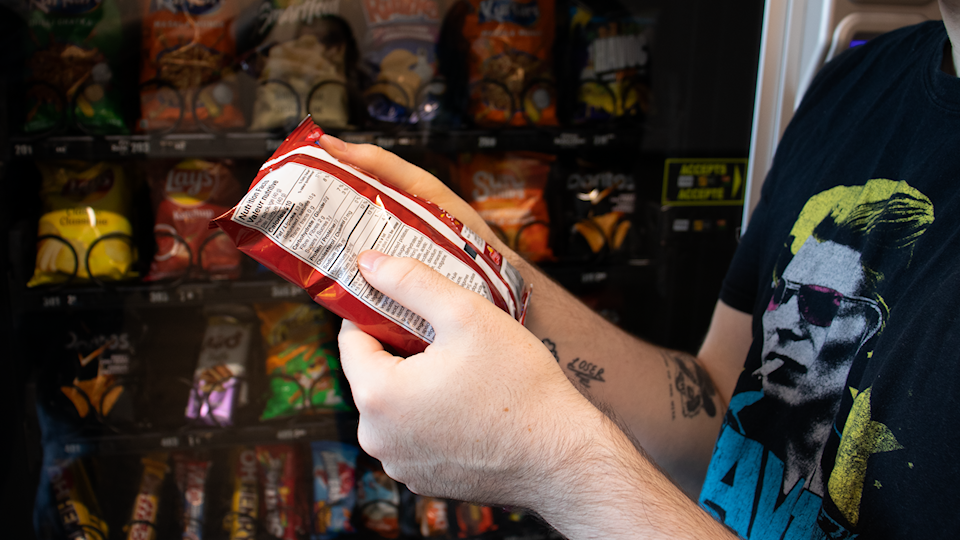For just a toonie, a bag of ketchup potato chips drops from the vending machine with a satisfying thud. Its bright red packaging shines like a fire extinguisher, and the move to grab it like an emergency.
This crunchy comfort snack has been my go-to during mid-term season, painful periods and bouts of boredom since I landed in Canada two years ago.
The sweet yet tangy flavour met my taste buds like a new friend, or so I thought.
It turns out junk foods are just as addictive as cigarettes, a 2023 study published in the British Medical Journal (BMJ) revealed.
These snacks are deliberately engineered to contain high amounts of sugar, salt and fat that hit a “bliss point,” a flavour peak that hijacks our brain and drives their products off the shelves.
The term “bliss point” was coined by Howard Moskowitz, an experimental psychologist and market researcher. Big food corporations hire experts like Moskowitz to keep us eating more than we need to.
I eventually realized the industry meant to feed us is a foe, not a friend.
Indeed, the marketing tactics these companies use to create these learned cravings echo those employed by the tobacco industry.
The Truth Tobacco Industry Documents reveal how cigarette companies, which also owned food and beverage manufacturers, targeted children in the United States using cartoons, toys and advertising dollars to exploit nostalgia and cultivate loyalty to sugar-laden products.
While these snacks may seem cheap, the real cost goes beyond our wallets.
A more recent study published in the BMJ found overconsumption of processed foods is linked to obesity, diabetes, heart disease, mental disorders and even cancer.
Eleven million deaths a year are tied to poor diet around the globe, according to a 2017 study published in The Lancet.
The researchers also found that a high intake of sodium and a low intake of whole grains and fruits were the leading dietary risk factors for death.
There’s irony in the fact that the onus of healthier eating is often placed on consumers when our choices are predetermined.
A 2018 study funded by the Canadian Institutes of Health Research found that people believe unhealthy foods are far more than nutritious ones in university and workplace settings.

For example, Humber Polytechnic claims to prioritize healthy foods in its strategy report, but vending machines still display chocolate bars, candies, cookies and snacks.
One has to fork out $6.99 for a small pack of sliced melon that sits sadly in a campus fridge somewhere.
It is easy to see why almost two-thirds of adults and one-third of children and youth in Canada are overweight or living with obesity, according to a March statement by the Public Health Agency.
For others, their food choices are even fewer.
High-sodium processed foods, such as pasta sauce and canned soups, dominate food banks and food rescue apps because of their long shelf life.
Natalie Riediger, an associate professor specializing in food equity at the University of Manitoba, told Humber Et Cetera in April that for someone budgeting, spending $4.99 on whatever is available can be a necessary choice, even if it means sacrificing nutrition.
A single, working parent or someone juggling two jobs may also not have the time or energy for proper meal preparation.
Giant catering company Chartwells controls most of the food services across Humber’s campuses. Students have long complained about its mandatory meal plans, but yesterday’s protest attempt at Lakeshore didn’t gather any steam, revealing a lackadaisical attitude among students.
While any food is better than none, it’s important to realize that junk foods are a modern invention made with profit in mind.
Canada could follow the United Kingdom’s lead to control this ballooning epidemic.
The U.K. introduced the sugar tax on soft drinks in 2018, causing a drop in adult sugar intake by more than two teaspoons per day in the first year, according to a study by the London School of Hygiene and Tropical Medicine.
Furthermore, in early October of the following year, an advert ban for junk food, which applies to commercials shown on television before 9 p.m., will roll out to tackle childhood obesity.
Michael Moss, Pulitzer Prize-winning investigative journalist and author of Hooked, said in a President's Lecture Series talk at Humber North campus that schools are accountable, too.
“It has to start with helping to educate [students] on the significance of food to their health and their ability to kind of make choices for themselves,” Moss said.
To teach about food in an engaging rather than preachy manner, he said the addition of gardening programs and a new curriculum would motivate students to learn about the multinational companies and politics behind their food.
Moss said families should have open and honest conversations.
“When we would go to the cereal [aisle, me and my two boys] would play a game where we would ask them to look for a brand that had eight grams of sugar or less per serving,” he said. “It would become an Easter egg for them.”
I won't claim quitting chips will be simple.
A gruesome picture of a person with a hole in his throat on a cigarette pack didn’t stop my dad from smoking. Pressure from us, his children, and chest pain did.
However, we don't have to wait until it reaches the point of no return.
We can’t help ourselves.
But the combination of government regulations, community outreach, food education, fair income and better access to affordable whole foods would put the power back in the hands of consumers and guide us toward a world with genuine food as it once was.



